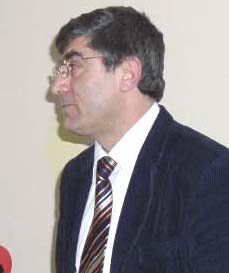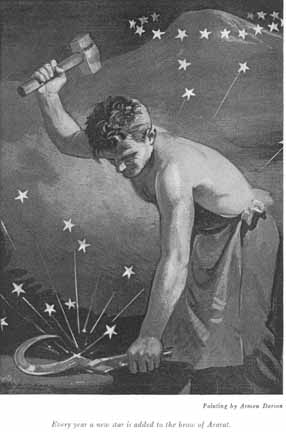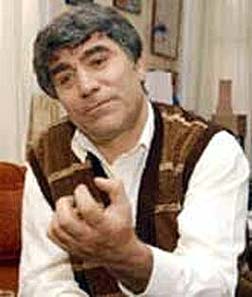|
|
Hrant Dink has certainly opened a can of worms
with the statement he made in 2005, 'I Am a Turkish Citizen, but I Am No
Turk.'
Hrant Dink is the editor of the Istanbul-based Armenian
newspaper, AGOS (or "Akos"); this is the one where Taner Akcam had
or has been permitted to write a regular column, working to poison the minds
of Armenian Turks.
Hrant Dink seemed — from what little I know of him —
to be somewhat "reasonable." For example, in this commentary on ARARAT (in the
section under "More Criticism"), Dink came down hard on Director
Atom Egoyan, for having made a film damaging to the Turco-Armenian relations.
Further of my impressions were formed by his statements, as recorded by
"A Diaspora Armenian Sizes Up an Armenian Turk" (halfway down this page.)
I fear Mr. Dink has become emboldened over the
years, with the increasing power of "Armenian Genocide" forces...
the tentacles of which are now threatening to reach Turkish society.
|
|
|
| |
An article written by Tatoul Hakobian informs us Dink (whose name is
spelled as "Dinq") was charged with "insulting the Turks" by the Urfa
Public Prosecutor's Office; "If the charge brought against him is proved, he will be
sentenced to 3 years of imprisonment."
 |
|
Hrant Dink
|
Dink is quoted as having said, "I don't think this is a serious
suit." I hope he's right. Not every nation has Freedom of Speech laws protected by
the United States Constitution, but to be charged with making unpopular statements is not
a policy that should be supported. It would be akin to being charged in countries like
France and Switzerland for stating there was no Armenian "Genocide."
But let's focus on the statement itself.
Certainly Dink is making an accurate statement in claiming he is not
a racial Turk, particularly if his family tree had avoided any co-mingling through
the six or so centuries of co-existence. So he's off the hook if that's all he meant.
But people who live in Turkey are Turks. The nation is composed of
many different ethnic varieties. For example, I recently learned there were four to five
times as many Abkhazians in Turkey, after many had been ruthlessly driven away with other
Muslim minorities (through Russia's 19th century "Death & Exile" campaign),
as there are in the Abkhazia region in today's Georgia. Now, racially, these people from
the Caucasus are not Turks.
Nor are the Laz, who have also been driven away. Nor Circassians,
and all the many others. Among non-Muslims, the majority of Jews who still live in Turkey
today can't be said to be of Turkic stock.
Yet whom among these people wouldn't call themselves
"Turks"?
Especially if you've lived in Turkey, prospered in Turkey, and your
forefathers have lived in Turkey... especially when there was no other nation that would
provide refuge for your people, when they were expelled from other lands.
For example, I'm an American, but I don't have a drop of
"Native American" blood in me. So I'm not "racially" (or
"ethnically") an American. But I don't go off making a statement like, 'I Am an American Citizen, but I Am No American.'
(I guess the only time I would feel that way is if I were a spy.
We've seen such scenes in espionage films... where the spy has a handful of passports from
different nations, for the purposes of expediency.)
|
"Our
Armenian compatriots are for the most part prosperous; they go to the best clubs and
have their island summer houses ... You'd expect them to take the Turkish side against
Europe. So why have they remained silent?" wrote Emin Colasan, right-wing
columnist in the mass-circulating "Hürriyet" newspaper, whose logo includes
the words "Turkey for the Turks".
TIME Europe, "Debating Genocide," Andrew Finkel, Jan.30, 2001
|
This is the kind of mentality that's peculiar among Armenians.
No matter where they live, the Dashnak-minded
among them think of themselves as Armenians first, second, and last. The nations
they happen to be living in happen only to be a convenience.
That's horrible!
One of my statements (not always, but too often
true) bears
repeating here: "Loyalty and Armenians. Like Oil and Water."
|
"In the February 13,
2004 issue of Agos, Mr. Dink, in describing the Armenian identity, made reference to
'poisoned blood spilled by the Turk,' contrasting it with 'clean blood in the noble
Armenian vein.'"
Dr. Ferruh Demirmen, in a late-2005
letter to Elif Shafak
|
This attitude is nothing new. Tacitus, the
Roman historian, reported in his Annalum Liber:
"The Armenians change their position relating
to Rome and the Persian Empire, sometimes supporting one and sometimes the other ... they
are a strange people"
After WWI, the Armenians
in Georgia didn't even want to register as Georgian citizens in order to vote! (Yet,
hypocritically, Armenia required citizenship from the Georgians among them, in order
for them to vote.)
Of course! What nation exists on earth that does not
require citizenship, before participating in an election process?
|
How many
Armenian-Americans would say, like Hrant Dink, 'I Am an American
Citizen, but I Am No American'?
The following is from an interview with Sam Weems:
Has the US political system been used by
ethnic lobbies for the interests of Armenia?
Yes! Armenians established in the United States, what they called their
"Armenian Colony", in about 1918. Armenia sent thousands of their citizens
to the United States to lobby America for money and support from individual
Christians, Christian churches and the US Government. This Armenian lobby has been
most successful and continues its activities to this day. The reason for their
success is because they play the ethnic race/Christian vs. Muslim cards so well. The
Armenians know that there is no "Muslim" lobby to refute and oppose them.
Do you think sometimes lobbyists may have put the aspirations of an ethnic group
above vital US interests?
I would phrase this question this way: Do you have personal knowledge that Armenian
Americans place their special interests above vital US interests? My answer is Yes!
Here is but one example of proof certain that Armenian-Americans do such things.
President Bush stated after September 11th that it was in the best interest of the
United States to reach out and build friendships throughout the Muslim world. One
such Muslim country the President reached out to, was Azerbaijan.
Armenian American politicians objected and fought the President's effort to
establish normal relations with Azerbaijan. Why? Because the Armenian lobby had been
successful in getting the US Congress to cut foreign aid to Azerbaijan after the
Armenians' sneak, surprise, cowardly and unprovoked attack on Azerbaijan in 1992.
Armenian American special interests were fearful that a new US/Azerbaijan friendship
would became strong and Armenia fears such a friendship/partnership. Thus Armenia
fought the United States War on Terrorism rather than permit America's building
friendships in the Muslim world. Selfish—Yes! Anti-Muslim—Yes! Against the best
interests of the United States—Yes!
Weems elaborates further in a separate essay
|
Aleksandr Sergeyevich
Griboyedov, the Russian diplomat and playwright who organized the transmigration of
Armenians from Iran, feared the penchant for Armenian disloyalty. As Russian
minister to Iran in the early 19th century, he wrote in a letter to the Czar.
"Majesty, I would like to ask you not
to allow the location of Armenians in the central Russian regions. Because they are
such filthy and shameless clans, they would soon shout throughout the world and
claim those lands as their 'ancient motherland'."
(Now he might have been a little harsh with his
description of the Armenians, but through this and many other historical records we
can ascertain the Russians never intended to help the Armenians and almost always
used them as pawns. Armenian
leaders' greed and fanaticism almost always permitted them to betray their Ottoman
nation, and side with what William Saroyan
himself said of the Russians: the real enemy of the Armenians.)
When Armenians betrayed their country and
fought — as "belligerents de facto," in Boghos Nubar's words — against their Ottoman nation
in WWI, did it matter whether their fighters originated from the Ottoman Empire,
Russia, or even as far away as the United States? Absolutely not. Once they came
together, they recognized only one nationality among themselves: they were
Armenians, first, second and last.
It was this disloyalty that put the Armenians
in the terrible position of needing to be relocated, just like what France and
America had done with their Alsatian and Japanese populations (respectively) during
WWII — with the exception that these people were not disloyal. And it is
dishonesty that made the Armenians point to these events to a lazy-thinking and
bigoted "Christian" Western world, labeling the events as a
"genocide."
|

"Every year a new star is
added to the brow of Ararat." (Painting by Armen Darson) I can't be sure
what this means; whatever the meaning, this illustration is from the 1950 issue of "Armenian
Affairs" Magazine, celebrating the "30th Anniversary of Soviet
Armenia." I'm not saying such an anniversary shouldn't have been celebrated;
after all, Armenia, "occupied" though it may have been, was the only game
in town for Armenians. However, since this page is about loyalty, I thought it was
interesting that this American magazine was so proud of Soviet Armenia, especially
since the Cold War was red-hot. Shouldn't Armenian-Americans have instead been
hollering about being freed from the "Soviet Yoke"?
|
"Particularly lately, when the talks on
Turkey's membership to EU
became more active, Dink is being invited to many conferences, including to those
held in Europe. He is being cited in almost all the articles about the Armenian
Genocide and the Turkish-Armenian relations published in the Western press,"
Hakobian's article tells us.
 |
|
Hrant
Dink in a Kirk Douglas gesture
|
Since Dink is being looked upon as a leader
among the Armenian community in Turkey, perhaps that is what is giving him the
boldness... or perhaps the sense of responsibility as an Armenian patriot...
to shed pretensions of looking upon Turkey as his motherland. This is why the
article further tells us that Dink spoke out against what schoolchildren pronounce
in Turkish schools, in what seems to amount to a less imposing version of America's
Pledge of Allegiance: "I am a Turk, I am honest and hard working,"
In response, in an interview with Azg,
Dink is quoted as having stated:
"I said during the conference that I am an
Armenian, I am no Turk, I am merely a Turkish citizen."
"Merely" a Turkish citizen. As if it
doesn't matter what nation he calls home. The nation he occupies is simply a base
from which to further Armenian objectives. In this case, a nation that happens to be
the target of worldwide Armenian hostility.
I hope not all Armenian Turks have begun to
feel this way. The "genocide" topic was not referred to as national policy
since the republic's beginnings, in a mature attempt to stress brotherhood.
But now that the destructive effects of this
hateful genocide lie is beginning to penetrate Turkish society, polarization will no
doubt be the result. The cycle will continue, just like in the Ottoman Empire;
first, people live side-by-side peacefully. Then, greedy and fanatical leaders
attempt to wedge the people apart for political purposes. Finally, each side has to
choose their own, because one side increasingly tries to do the other in.
At least Hrant Dink is honest about where he
stands. But such declarations are not going to help the solidarity among the people
in Turkey.
|
| |
|
|